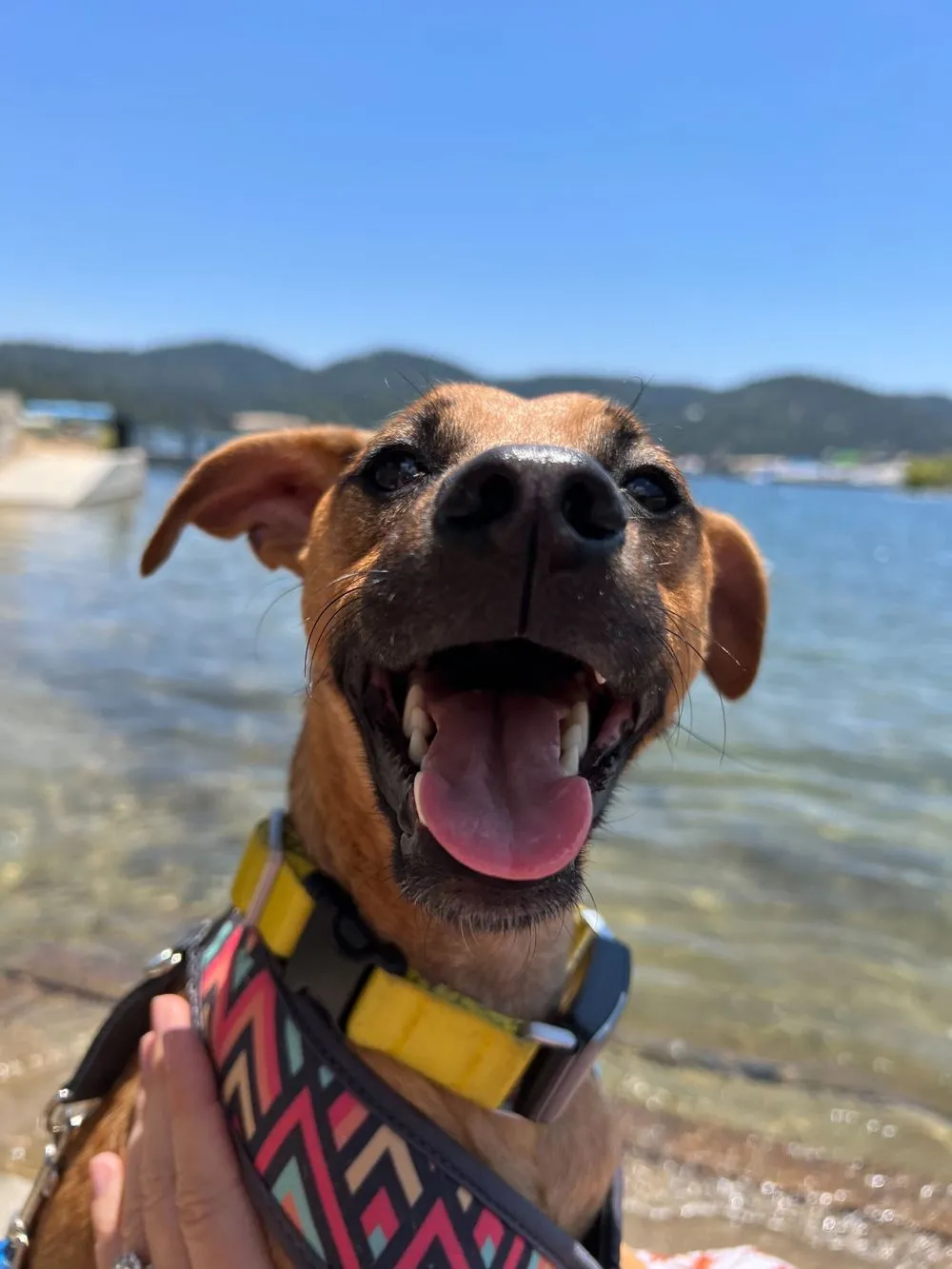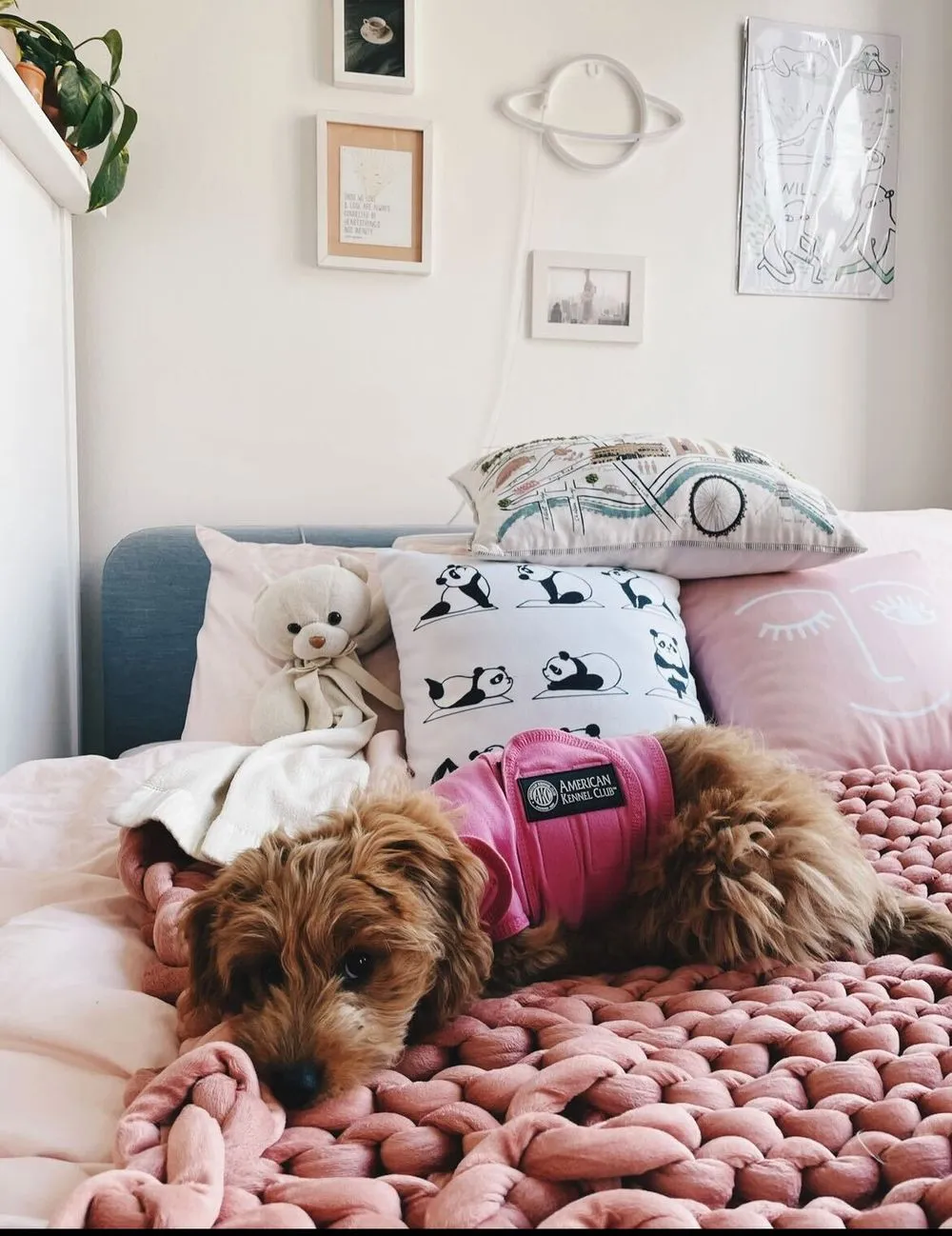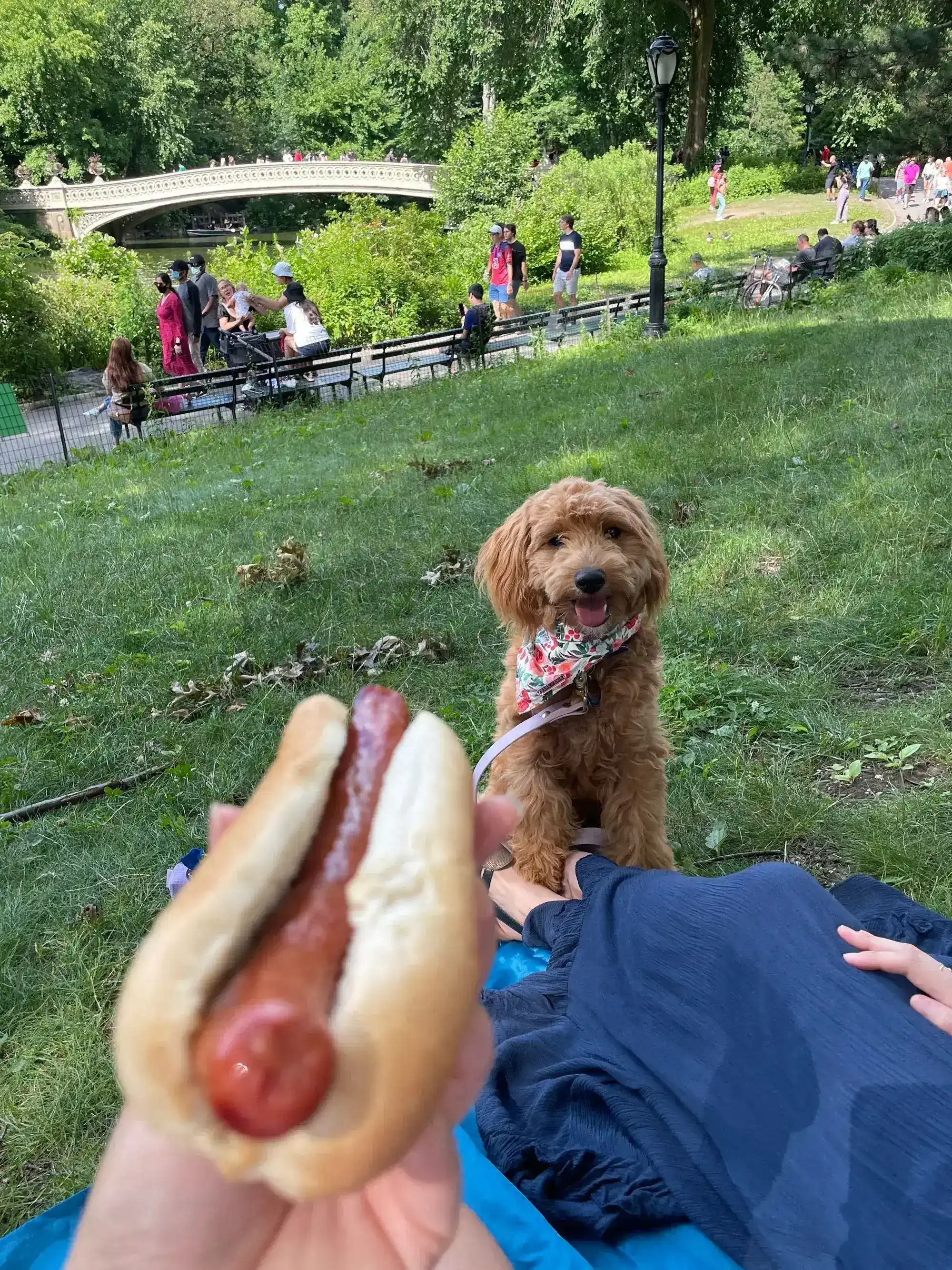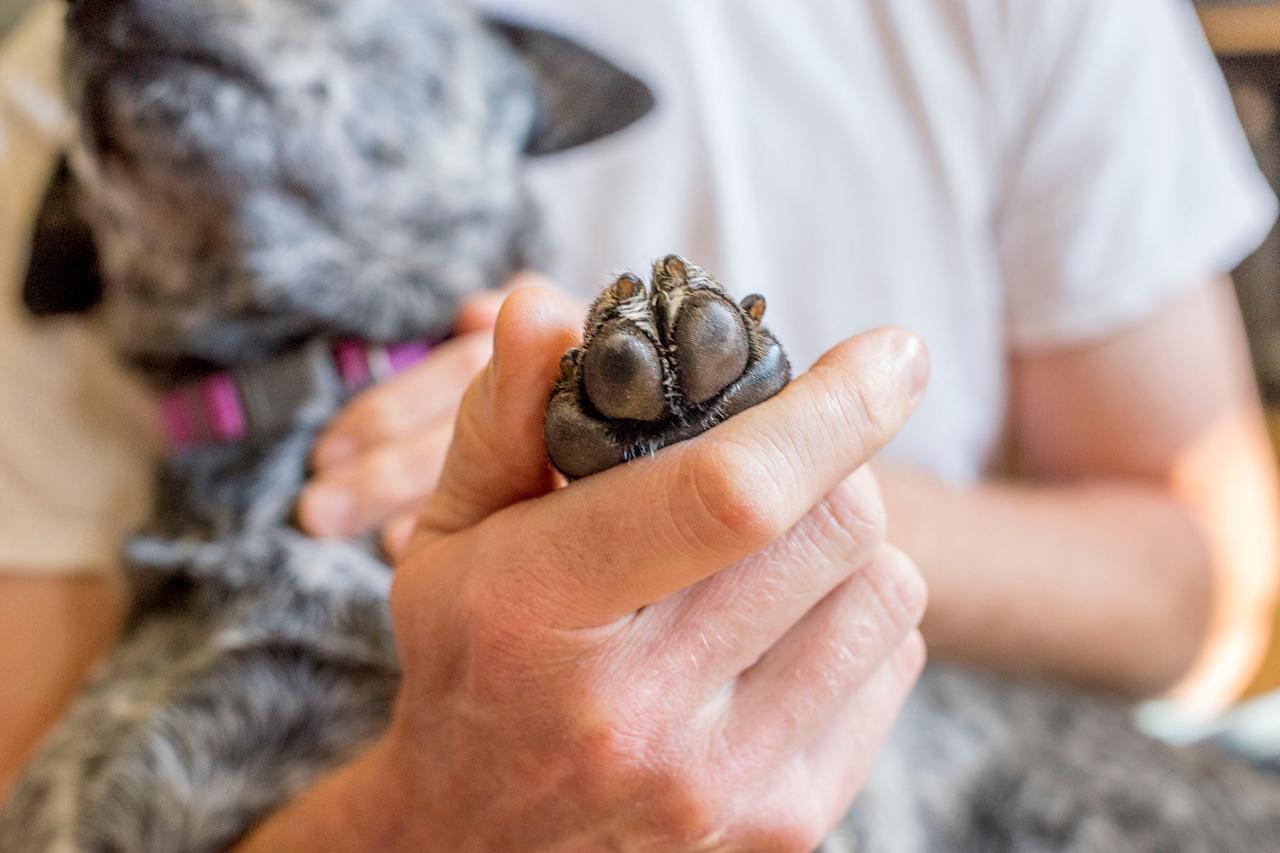As the the Fourth of July approaches, it's important to remember that loud noises and bright lights can be extremely distressing for animals, leading to an increased risk of pets running away.
We interviewed two experts, Mary Kelly from the Humane Society for Greater Savannah and Meggan Oksness from the HIT Living Foundation, an animal shelter based in Los Angeles, all about keeping our bestest buddies safe during the Fourth of July fun. They share tips on keeping dogs calm during fireworks, spotting signs of anxiety, prepping pets for the big day, and what to do if your pup gets spooked and runs away.
We’ve read that more pets run away on the 4th of July weekend than any other weekend throughout the year*. What is your experience with the July 4th holiday?
Mary Kelly, Humane Society for Greater Savannah – During the few days leading up to and the few days after the 4th, we are constantly getting phone calls about missing pets or pets others have found and have brought in to be scanned for microchips.
Meggan Oksness, HIT Living Foundation – Last year, we received a lot of inquiries via social media or our website on what to do with a found dog, specifically one that isn't microchipped.
What stories or reunion stories have you witnessed or heard about, specifically around the 4th of July?
Mary Kelly, Humane Society for Greater Savannah – We have heard stories from members of our community who have had their pets go missing due to the 4th of July activities. Mostly stories about dogs escaping from yards during fireworks. There are also the dogs who have slipped their leashes and run off when taken to view fireworks. If pets are microchipped we help to facilitate their reunion to their families.
Meggan Oksness, HIT Living Foundation – There was an adopter whose mother left a gate open for a second. It was a perfect storm of the gate being left open, her son opening the sliding glass door and a firework going off that made their new adopted friend bolt. Luckily he hid in a neighbor's bushes and was found, but it could have been so much worse.

How can owners keep their dog(s) calm during fireworks?
Mary Kelly, Humane Society for Greater Savannah – Prior to July 4th, owners can visit their veterinarian to be prescribed medication to help with anxiety due to fireworks. Owners can also use calming treats, pheromone sprays, and compression garments (such as thundershirts) to help keep their dogs calm. Make sure to keep the dog in a place where they cannot see flashing lights caused by fireworks. Another great solution is to keep the dog in a quiet area with calming music (classical or reggae) and white noise.
Meggan Oksness, HIT Living Foundation –
- Create a cozy den: Set up a comfortable area for your dog with their favorite blankets and toys. This can be a safe space for them to retreat and feel secure during the fireworks.
- Use a thundershirt or anxiety wrap: These specially designed garments provide gentle, constant pressure that can help soothe dogs with anxiety. Putting one on your dog before the fireworks can help them feel more secure.
- Consider natural calming remedies: Some dogs may respond well to natural calming treatments such as lavender essential oil, pheromone diffusers, or herbal supplements. Consult with your veterinarian to determine which options are suitable for your dog.
- Stay calm and relaxed: Dogs can pick up on their owner's emotions. By staying calm and relaxed, you can help reassure your dog and minimize their anxiety.
- Provide distractions: Engage your dog in activities or play games that capture their attention, diverting their focus from the fireworks. Interactive toys or puzzle feeders can also help keep their minds occupied.
- Remember, every dog is different, so it's important to observe your dog's behavior and adjust your approach accordingly. If you have any concerns or if your dog's anxiety is severe, it's always a good idea to consult with your veterinarian, or a certified dog trainer, for personalized guidance.

What are the signs of anxiety or distress in pets during fireworks?
Mary Kelly, Humane Society for Greater Savannah – Signs of anxiety and distress to look out for include pacing, tension in the facial muscles, panting, wide eyes or dilated pupils, body quivers, tail tucked, ears flat back against the head, and hiding. You may also see dogs that are “on alert” with their ears erect, tail held up high, hyper-vigilant, hair on their back standing up, and growling or barking.
Meggan Oksness, HIT Living Foundation –
- Restlessness or pacing: Pets may become more agitated and exhibit increased movement or inability to settle down.
- Trembling or shaking: Dogs and cats may shake or tremble as a response to loud noises.
- Hiding or seeking shelter: Pets may try to find a safe place to hide, such as under furniture or in a closet, to escape the noise.
- Excessive barking or meowing: Pets may vocalize more than usual as a reaction to the loud sounds.
- Panting or drooling: Increased respiratory rate or excessive drooling can be signs of stress in pets.
- Destructive behavior: Pets may exhibit destructive behaviors like chewing or scratching furniture, doors, or walls in an attempt to escape or cope with their anxiety.
- Loss of appetite: Some pets may lose interest in eating or have a decreased appetite due to stress.
- Changes in elimination habits: Stress can cause pets to have accidents indoors or exhibit changes in their litter box habits.
How can owners prepare their pets for fireworks?
Mary Kelly, Humane Society for Greater Savannah –
- Use blackout curtains to minimize exposure to light flashes caused by fireworks and limit the view of the outdoors.
- Set up a comfortable space in the home where the dog can seek shelter (like a crate).
- Use a sound machine to drown out noises that may cause anxiety or stress.
- If owners will be having company over or will be constantly coming and going, secure their dog(s) in another room where they cannot escape.
Meggan Oksness, HIT Living Foundation –
- Keep them indoors: Bring your pets indoors before the fireworks begin. Close windows and curtains to muffle the sound and reduce the visual stimulation.
- Provide distractions: Engage your pets with activities that can divert their attention from the fireworks. Interactive toys, treats, or puzzle games can help keep them occupied.
- Mask the noise: Play calming music or turn on the television to mask the sound of fireworks. The background noise can help drown out the loud bangs and reduce stress.
- Stay calm and relaxed: Pets can sense their owner's anxiety, so it's important for you to remain calm and act normally during fireworks. Offer reassurance and provide gentle, soothing words to comfort your pet.
- Consult your veterinarian: In severe cases of anxiety, your veterinarian may be able to provide medications or recommend natural remedies to help calm your pet during fireworks.
What should you do if your dog runs away?
Mary Kelly, Humane Society for Greater Savannah – Immediately begin searching for them. Post to social media, distribute flyers, check at local shelters, and contact veterinary offices. Place something with their scent in the area where the dog was last seen. Ensure microchip information is up to date with current contact information.
Meggan Oksness, HIT Living Foundation –
- Act immediately: Start searching for your dog as soon as you realize they are missing. Time is of the essence, especially during a festive occasion like the Fourth of July when loud noises can frighten pets.
- Search the neighborhood: Begin by searching your immediate neighborhood, including streets, parks, and nearby areas. Ask your neighbors if they have seen your dog and enlist their help in the search.
- Use visual aids: Create and distribute flyers with a clear photo of your dog, your contact information, and details about when and where they were last seen. Post the flyers in your neighborhood, at local veterinary clinics, pet stores, and community bulletin boards.
- Utilize online resources: Post information about your missing dog on social media platforms, local lost and found pet groups, and websites dedicated to reuniting lost pets with their owners. Include all relevant details and photos to help people identify your dog.
- Contact animal shelters and rescue organizations: Notify nearby animal shelters, and rescue organizations about your missing dog. Provide them with a detailed description and any identifying features of your pet. Ask rescue organizations to post your flyer.
- Expand your search: Extend your search beyond your immediate area. Contact nearby veterinary clinics to report your missing dog. Leave them with your contact information and a description of your pet.
- If you receive any information or sightings, follow up on them promptly. Keep a record of all leads and communicate with people who might have seen or found your dog.
- Additionally, taking preventive measures such as ensuring your dog is microchipped and wearing identification tags can greatly increase the chances of being reunited if they go missing.
What are some tips to help prevent pets from getting lost?
Mary Kelly, Humane Society for Greater Savannah – Do not take your dogs to view fireworks. Leave them at home. Remember a fearful, stressed, or anxious dog may bust out of screen doors, jump over or dig under fences, and flee when in a state of panic.
It’s extremely important to make sure pets have on an appropriately fitted collar with an identification tag. The tag should have the dog's name, the owner's name, and the owner's phone number. It’s important to keep microchip information current and to note that microchips are not GPS units. If owners are concerned about their dogs getting lost due to the 4th of July activities, it is a great idea to invest in a GPS-tracking collar such as the Fi Series 3 Collar.
Meggan Oksness, HIT Living Foundation –
- Keep pets indoors: Keep your pets safely indoors during fireworks displays. Create a calm and secure space for them inside your home, away from doors and windows.
- Provide identification: Ensure your pets have proper identification, including a microchip and collars with tags containing up-to-date contact information. Make sure your dogs are wearing their Fi collars, and they are fully charged.
- Secure your property: Make sure your yard or outdoor area is securely fenced to prevent pets from escaping. Check for any potential gaps or holes that they could squeeze through.
- Close windows and curtains: Close all windows, blinds, and curtains to minimize noise and visual stimuli that could distress your pets. This can help reduce their urge to escape.
- Create a calming environment: Create a quiet and soothing environment indoors by playing soft music or using white noise to mask the sound of fireworks. Consider using pheromone diffusers or calming products specifically designed for pets.
- Stay with your pets: If your pets are particularly anxious during fireworks, stay with them to provide comfort and reassurance. Your presence can help alleviate their stress and anxiety.
- Tire them out: Engage your pets in physical and mental activities earlier in the day to help tire them out. A tired pet is less likely to be as anxious or restless during fireworks.




(Clockwise L-R) Maple eyeing a hotdog, Maple in her thundershirt, Jax at the beach, Kevin on a paddleboard
Any last tips, comments, or stories surrounding July 4th and pet safety?
Mary Kelly, Humane Society for Greater Savannah – While fireworks can be fun for some humans, they can be frightening for pets. Set your pet up for success during this stressful time by taking them out to potty before the fireworks start. Provide them with enrichment (such as training sessions, frozen treats chews, or puzzle games) to give them a mental workout before and during fireworks. Most importantly, provide them with comfort and support if your dog is struggling during the 4th of July.
Meggan Oksness, HIT Living Foundation – Shelters are not only a scary place, but they are also FULL. Please help your animals stay safe by taking all of the necessary precautions listed.
The stories and advice shared by Mary Kelly and Meggan Oksness are reminders to prepare your dog's safety plan for any upcoming holidays, especially one's with bright lights and loud noises. It's crucial for pet owners to be proactive in preventing their beloved companions from becoming anxious or running away.
Create your own checklist, based on your dog's preferences and behaviors. Let's create a safer and more enjoyable environment for our pups!
For more Summer pet safety tips, be sure to check out these articles:






